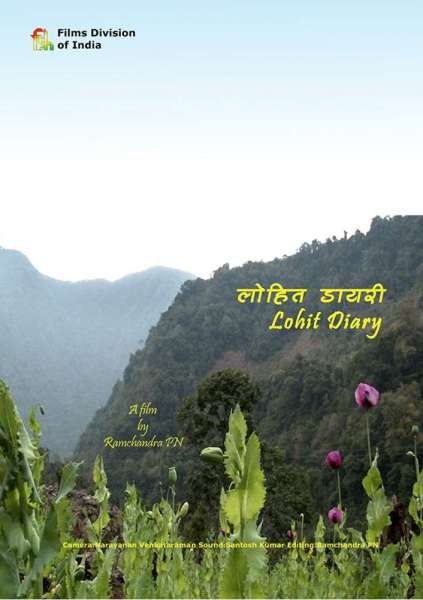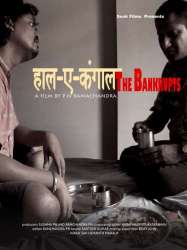Lohit Diary is a film directed by Ramchandra PN
Lohit Diary (2014)

If you like this film, let us know!
- Infos
- Casting
- Technical infos
- Photos
- Videos
- Film quotes
- Characters
- Music
- Awards
Length 1h16
Directed by Ramchandra PN
Lohit Diary, English: Lohit Diary is a 76 minutes documentary film produced in India, set the Lohit River Valley in East Arunachal Pradesh, North-East India. The film is produced by Films Division of India and is directed by Ramchandra PN. The film, completed in 2015, was shot in and around Tezu, Wakro, Namsai, Chongkham and Yatong areas in Arunachal Pradesh in India.
"The film covers aspects of the threat of opium addiction looming large over the local youth, and social initiatives from the community against the menace such as the opium de-addiction campaign in Chongkham-Namsai, the organic tea-cultivation in Wakro circle led by Basamlu Krisikro, and the ‘Joy of Reading Campaign’ in Yatong, Tezu and Wakro, led by the Lohit Youth Library Movement,"(Source: Arunachal Times)
Synopsis
Lohit River Valley, the picturesque eastern most remote part of Arunachal Pradesh in India, the land of Mishimi community, is showing signs of prosperity. Epitomized by its colorful flowers that bloom all over is the crop that is responsible, the banned opium. Traditionally, cultivated for rituals and medicinal purposes, today a large portion of the harvest consumed by the cultivators themselves and the rest sold locally to opium addicts to meet the economic needs of the planters.Comments
Leave comment :
Suggestions of similar film to Lohit Diary
There are 7 films with the same director, to have finally 7 suggestions of similar films.If you liked Lohit Diary, you will probably like those similar films :
 , 1h16
, 1h16Directed by Ramchandra PN
[[File:|thumb|200px|left|Miyar House]] The filmmaker’s 200-year-old ancestral house is dismantled, giving him an opportunity to undertake a journey into a past. It is a past that he shares not only with his extended family, but also with successive generations of India’s rural population. Armed with a cranky digital camera, he and his friend Ajay Raina sets out to document the dismantling process. They meet the four owners of the house – the uncles and aunt of the filmmaker - and gather from them what it means to undergo the process of change and migration. A sense of nostalgia and loss; as well as the excitement and the insecurity of the future accompany this process; the essence of which is transition. A realization of the inevitability of this transition marks this journey. It could well have been the journey of a country that has propelled itself into modernity. As plans are on for the house to get reconstructed elsewhere in an open-air museum, out of its original context – for the filmmaker, the fossilization seems to be complete. The film ends with the tile that says that the filmmaker's father has expired in Mumbai in 2010.

Haal E Kangaal (2014)
, 1h45Directed by Ramchandra PN
Actors Niraj Sah, Hemant Mahaur
Two struggling filmmakers meet after a gap of fifteen years and amidst celebration, enmity and jealousy realise that they are as bankrupt as every before - in all sense of the word.

Rice and Rasam (2012)
Directed by Ramchandra PN
The film deals with the two troupes of professional theater artist Rajanna Jewargi as they struggle to adapt to times, remain relevant and survive. Gubbi Nagesh, a member of the erstwhile Gubbi Company, his wife Gubbu Manjula, son Prashant Gubbi, daughter Sweta Gubbi are also part of this entourage. The film shows the dismantling and reconstruction of the theater; and the condition in which the artists live.

BV Karanth:Baba (2012)
, 1h33Directed by Ramchandra PN
Genres Biography
B V Karanth runs away as a child from his house in Babukodi in Karnataka to learn music in Mysore; instead he joins Gubbi Company, a professional theater company run by the legendary theater and film personality Gubbi Veeranna. Quest for knowledge first takes him to Banaras in North India where he learns Hindi language and Indian classical music and then to Delhi where he joins the second batch of the theater course at the National School of Drama. He later travels all over India conducting workshops and training people in modern theater. Films beckon him and his films gain critical acclaim and awards in India. He returns to Delhi to head the National School of Drama. Restlessness leads him to Bhopal in Madhya Pradesh where he starts the Rang Mandal, a professional theater repository for the Bharat Bhavan under the Government of Madhya Pradesh. A controversy in Bhopal where is was accused of setting fire to a co artist cut shot his stint there. He returned to Mysore to start the Rangayana, yet another theater repertory, this time Kannada language based. B V Karanth continues to work till his death due to cancer in 2002.

Putaani Party (2009)
, 1h18Directed by Ramchandra PN
Themes Children's films
Rating66%





A Gram Panchayat (village governing body) in rural India facilitates the functioning of the Makkala Samiti (Children’s Committee) – a children’s body elected by the children themselves.

The Cleansing Rites (2005)
, 1h45Directed by Ramchandra PN
Themes Films based on plays
Rating71%





Suddha depicts the death of the feudal system that existed among the Tulu speaking community in coastal Karnataka for many years, and the impact of The Land Ceiling Act which was ushered during the sixties and seventies, had on its social structure. It is the story of modern India - of changing caste equations and a realization of this reality among the land owning class, albeit a bit late. Though the film is set in a remote village near Mangalore, it could well have happened in any other village elsewhere in India.
 Connection
Connection